9+ Interview Thank-You Email Examples to Download
Even if you do get an interview, meet up with a potential employer, and seemingly ace the meeting, this is not an assurance that the job is yours. There are many other applicants that might have done just as well or even better than you, so you might not want to get your hopes up too high. You may also see meeting email samples.
Instead, what you could do is to make that one last pitch for yourself to prove your candidacy. But since you wouldn’t want to pressure hiring managers to choose you over the others, the least you can do is to thank them for the opportunity given so far. This can be done through a simple interview thank-you email that not only exhibits professionalism but courtesy as well.
After Interview Thank-You Email Example
Follow-up Interview Thank-You Email Example
Fresh Job Interview Thank-You Email Example
Why Send an Interview Thank-You Email?
Over the years, some major changes have affected the job interview process that many companies have adapted to. These days, applicants are asked to participate in video interviews, to provide their social media profiles to demonstrate their personal brand, or to create a sample of their work as directed, all to prove that they’re qualified for a job position.
But one thing that hasn’t changed and is often practiced by many job applicants is the need to send a thank-you message to potential employers. Although formal emails are more preferred as opposed to handwritten letters nowadays, this still serves as a great opportunity for you to express your gratitude for the interview and your dedication toward getting the job.
A professional email thank-you message has many advantages compared to the traditional pen-and-paper combo. Apart from quick and easy delivery, a message sent online also gives you the chance to introduce some of your work in the form of an online portfolio. Though the interview has already been conducted and the deliberation of candidates is on its way, there’s nothing wrong with reminding hiring managers why you’d qualify for the job.
For obvious reasons, another benefit of a thank-you email is that you can get your thank-you message delivered straightaway. Rather than going through the hassle of having the formal letter delivered by the postal service, and then waiting a day or two for the letter to be delivered, you can have the thank-you message written and sent on the same day.
This can be a crucial factor when vying for a job position that requires a hiring manager to make a quick decision to fill in empty slots.
If it’s urgent, they’re bound to look for someone who has the skills, character, and attitude to do the job effectively. But this also means that they could choose just about anyone who appears qualified for the position without further screening, so everyone has a chance, and it’s up to you to give yourself an edge over the competition. You may also see business email examples.
Internship Interview Thank-You Email Example
Interview Thank-You Email Format Example
Job Interview Thank-You Email Example
Lovely Interview Thank-You Email Example
The Anatomy of an Interview Thank-You Email
It’s all too easy to go on the search bar of your computer and download a post-interview thank-you template from an unknown site.
Unfortunately, recruiters are familiar with the tricks of the trade, so you’re bound to get caught one way or another. Though these emails are quite alike in terms of content, only the wisest know the value of writing a message that’s reflective of who you are. Keep in mind that personalization and authenticity are key toward success. It shows that you’re a genuine person, which can increase your chances for the job. You may also see application email examples.
When it comes to composing an interview thank-you email, you must focus on brevity and substance. Every word and sentence in your email must serve a purpose.
So rather than supplying you with a generic template, here’s a simple breakdown of how you can create an impressive interview thank-you email:
1. Subject Line
Like any formal email, the subject line indicates the purpose of the professional letter for recipients to notice. With the number of emails that fill a manager’s inbox on a daily basis, an empty subject line is easy to ignore or miss.
To ensure that an employer gets your message, create a subject line that is specific and attention-grabbing. You need to make it clear and comprehensive, so avoid any creative words that might be interpreted differently. Simply using the words “thank you” is an obvious indicator of what it’s for. You may also like follow-up email examples.
2. Salutation
When addressing your recipient, be sure to keep it formal and accurate with a polite greeting. Writing down “Dear Mr./Ms./Mrs.” is a good choice, as long as you’re addressing the right person, and you know how the interviewer’s last name is spelled. “To Whom It May Concern” might not be a good idea when doing this, or it might seem like you’re addressing multiple people with your format email.
3. Opening Paragraph
Begin your message with a sincere expression of appreciation for the time and effort that was taken to speak with you. Not many applicants get the chance to prove themselves in an interview, so this is a huge deal that you need to be grateful for. A great way to grab their attention is to compliment their recruitment or interview process, and show genuine interest toward the company and its vision for its employees. You may also check out announcement email examples.
4. Body
After which, you can then use the next one or two paragraphs to remind hiring managers of your selling points. You can use this to emphasize anything that you have forgotten to mention during the interview or failed to articulate well enough for the recruiter to remember. You need to be confident with your words to prove that you’re truly interested about working for the company and fitting the job position. You might be interested in email cover letter examples.
Additionally, be sure to make any references in regards to the interview to prove that you were interested and listening to what the recruiter had to say. Be sure to make an invite to contact you at any time if they have further questions they’d want to qualify. The contact information you provide must be updated and active to ensure that you’d pick up if they ever call. You may also see marketing email examples.
5. Closing Line
The end of your email would be just like any other closing remark. You can stick to the old-fashioned “Sincerely, (First Name and Last Name)” for a safe bet. You can also use the closing line written in your cover letter for consistency.
Phone Interview Thank-You Email Example
Simple Interview Thank-You Email Example
Unique Interview Thank-You Email Example
Things to Remember before Hitting “Send”
Now that you have drafted your letter, there are a few things that you need to review before clicking that “Send” button. With that said, here’s a general checklist to keep you on track:
1. Do it ASAP.
It’s always best to send your email within 24 hours of your interview. This ensures that a recruiter’s memory of you is still fresh, and punctuality certainly says a lot about your character. Keep in mind that timing is everything when it comes to business. You may also see feedback email examples.
2. Match the formality of the employer.
An impressive thank-you note is often something that complements the nature of a business. For instance, there are a lot of companies that strategically enforce a creative and casual environment for its employees. Although you still need to be professional with your letter, this also means that you can use a language that’s not as formal as writing a letter addressed to the President of the United States.
To determine the type of tone to use, take a look at the company’s dress code and workplace. This often says a lot about how the management directs its members. So if everyone’s wearing suits and blazers, your message should be as formal as it can get. You may also like introduction of yourself in an email.
3. Let them know it’s you.
Write a letter that reflects your personality. Letters copied over the Internet can sometimes be bland and generic, which can sound quite robotic to most readers. If you want to make the right impression, make sure you include at least references that will remind the interviewer of your meeting together. This will help the recruiter match your name with a face and an experience.
4. Customize your emails.
If you’re sending multiple emails to different people of the same organization, be sure that your thank-you message varies per email. Using the same template multiple times is a product of laziness. You need to make a connection in order to make an impact with your potential bosses. Otherwise, you may not seem sincere and genuine enough to be a part of the workforce. You may also check out internship email examples.
Tailor the simple letter according to what you know about the recipient. Apart from their standing in the company, since you’ve spoken with them during your interview, then you may have gotten a glimpse of their personality. If your interviewer seemed to focus more on the particular job requirement, then you can make a lead that supports it.
5. Don’t forget to proofread.
Never EVER forget to proofread your standard letter. Double-check, triple-check, or quadruple-check the letter until you’re completely satisfied with the results. Check for spelling or grammar errors in the document. Or better yet, have someone else, such as a friend or family member, take a look at your thank-you email before finalizing it. This allows you to review any mistakes that might have been missed while drafting the letter.
Make sure that names are spelled correctly and that the proper recipients are addressed accordingly. Fatal flaws like these are sure to change one’s perspective toward you.
Sending a post-interview thank-you email to an employer immediately after your meeting can help increase your chances for the job. It shows that you’re good at communicating even in times of uncertainty. With these tips, you can deliver the perfect thank-you message that’s sure to leave a mark on hiring managers.
So whether you feel confident about getting the job or not, it’s important to be polite with your words and courteous with your actions to show that you’re more than just a person with the talent and skills fit for a job role, but a person with excellent character as well.
9+ Interview Thank-You Email Examples to Download

Even if you do get an interview, meet up with a potential employer, and seemingly ace the meeting, this is not an assurance that the job is yours. There are many other applicants that might have done just as well or even better than you, so you might not want to get your hopes up too high. You may also see meeting email samples.
Instead, what you could do is to make that one last pitch for yourself to prove your candidacy. But since you wouldn’t want to pressure hiring managers to choose you over the others, the least you can do is to thank them for the opportunity given so far. This can be done through a simple interview thank-you email that not only exhibits professionalism but courtesy as well.
After Interview Thank-You Email Example
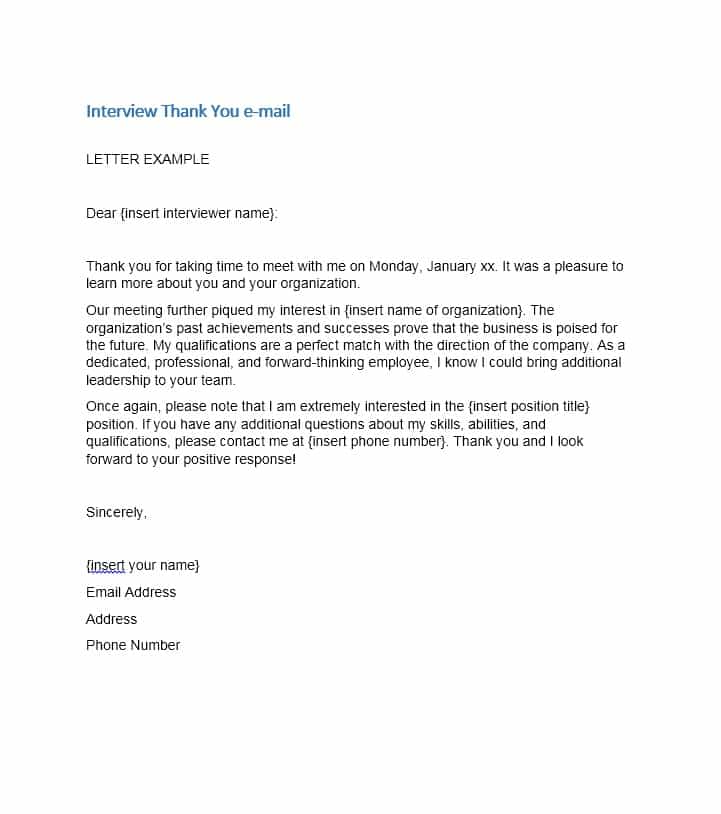
bravebtr.b-cdn.net
Details
File Format
PDF
Size: 43 KB
Follow-up Interview Thank-You Email Example
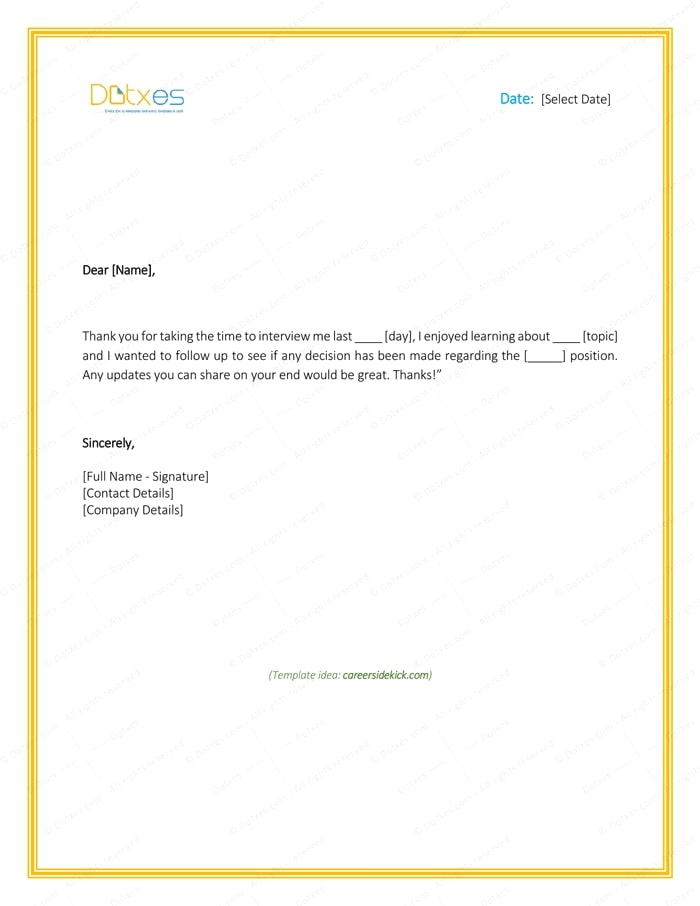
dotxes.com
Details
File Format
PDF
Size: 33 KB
Fresh Job Interview Thank-You Email Example
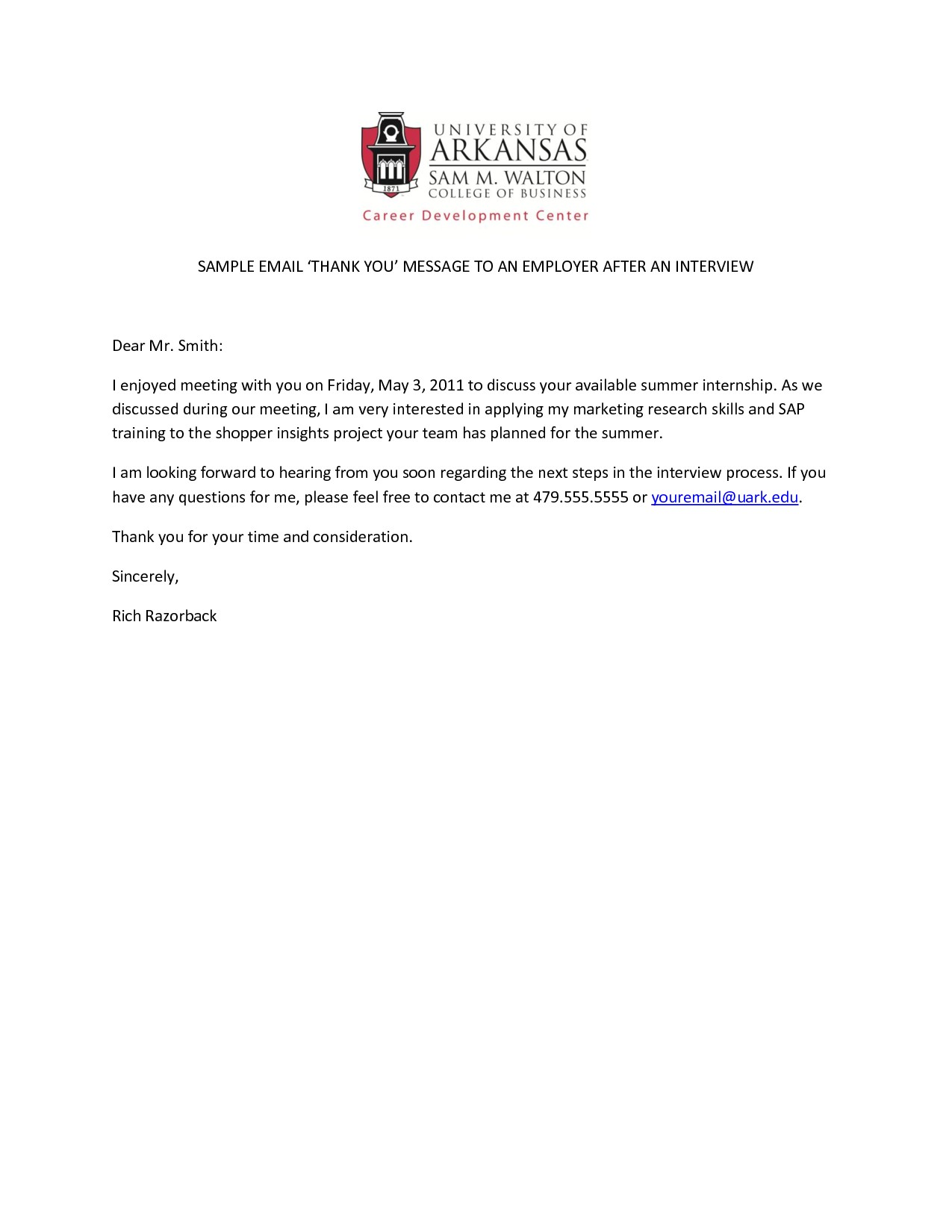
southeastpools.co
Details
File Format
PDF
Size: 77 KB
Why Send an Interview Thank-You Email?
Over the years, some major changes have affected the job interview process that many companies have adapted to. These days, applicants are asked to participate in video interviews, to provide their social media profiles to demonstrate their personal brand, or to create a sample of their work as directed, all to prove that they’re qualified for a job position.
But one thing that hasn’t changed and is often practiced by many job applicants is the need to send a thank-you message to potential employers. Although formal emails are more preferred as opposed to handwritten letters nowadays, this still serves as a great opportunity for you to express your gratitude for the interview and your dedication toward getting the job.
A professional email thank-you message has many advantages compared to the traditional pen-and-paper combo. Apart from quick and easy delivery, a message sent online also gives you the chance to introduce some of your work in the form of an online portfolio. Though the interview has already been conducted and the deliberation of candidates is on its way, there’s nothing wrong with reminding hiring managers why you’d qualify for the job.
For obvious reasons, another benefit of a thank-you email is that you can get your thank-you message delivered straightaway. Rather than going through the hassle of having the formal letter delivered by the postal service, and then waiting a day or two for the letter to be delivered, you can have the thank-you message written and sent on the same day.
This can be a crucial factor when vying for a job position that requires a hiring manager to make a quick decision to fill in empty slots.
If it’s urgent, they’re bound to look for someone who has the skills, character, and attitude to do the job effectively. But this also means that they could choose just about anyone who appears qualified for the position without further screening, so everyone has a chance, and it’s up to you to give yourself an edge over the competition. You may also see business email examples.
Internship Interview Thank-You Email Example
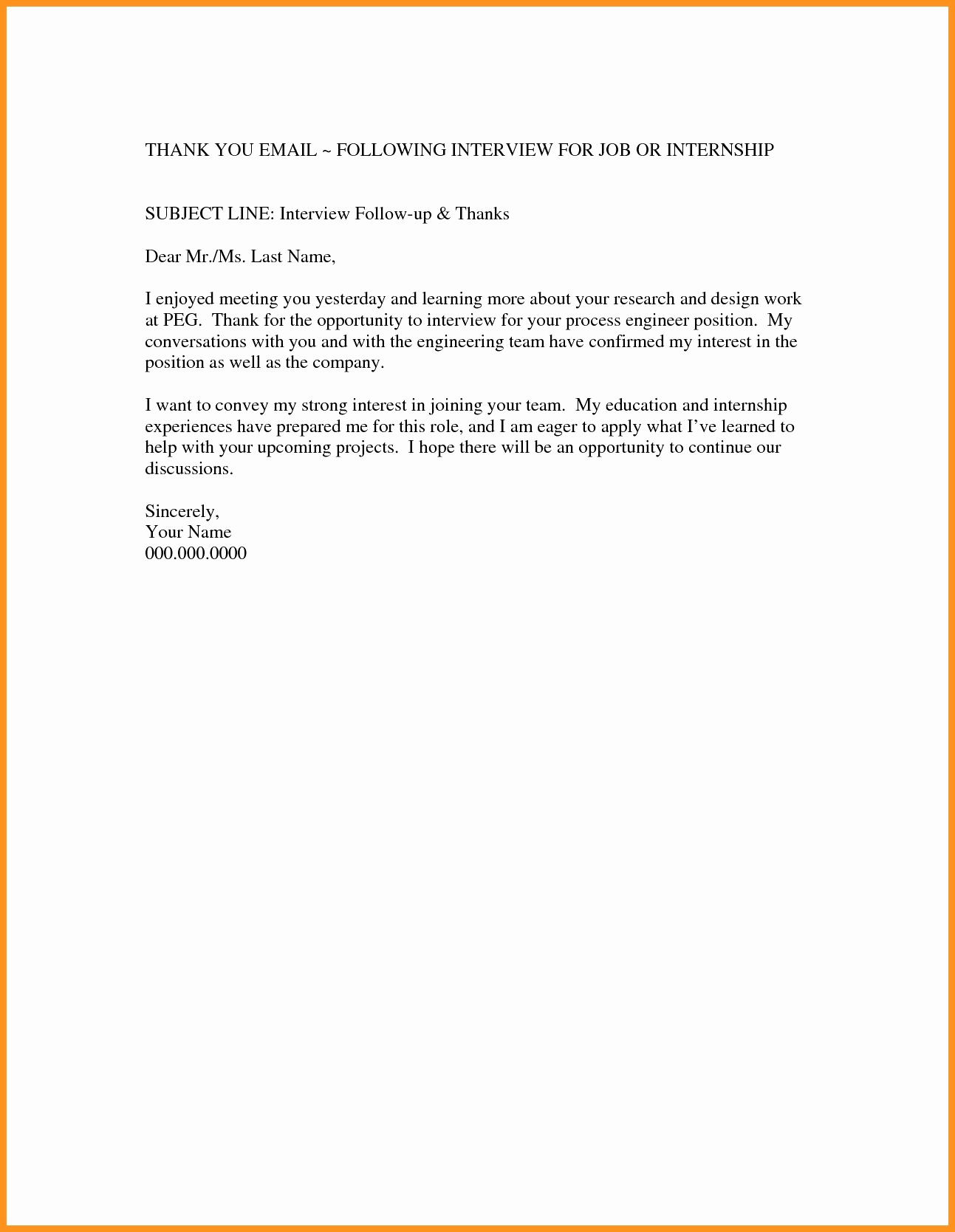
cosc2017.org
Details
File Format
PDF
Size: 89 KB
Interview Thank-You Email Format Example
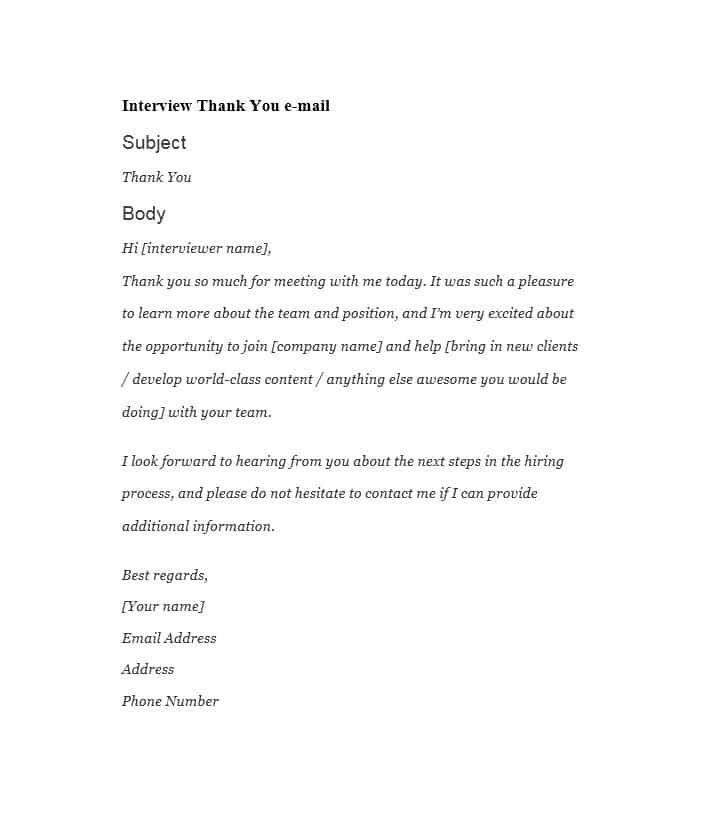
bravebtr.com
Details
File Format
PDF
Size: 29 KB
Job Interview Thank-You Email Example
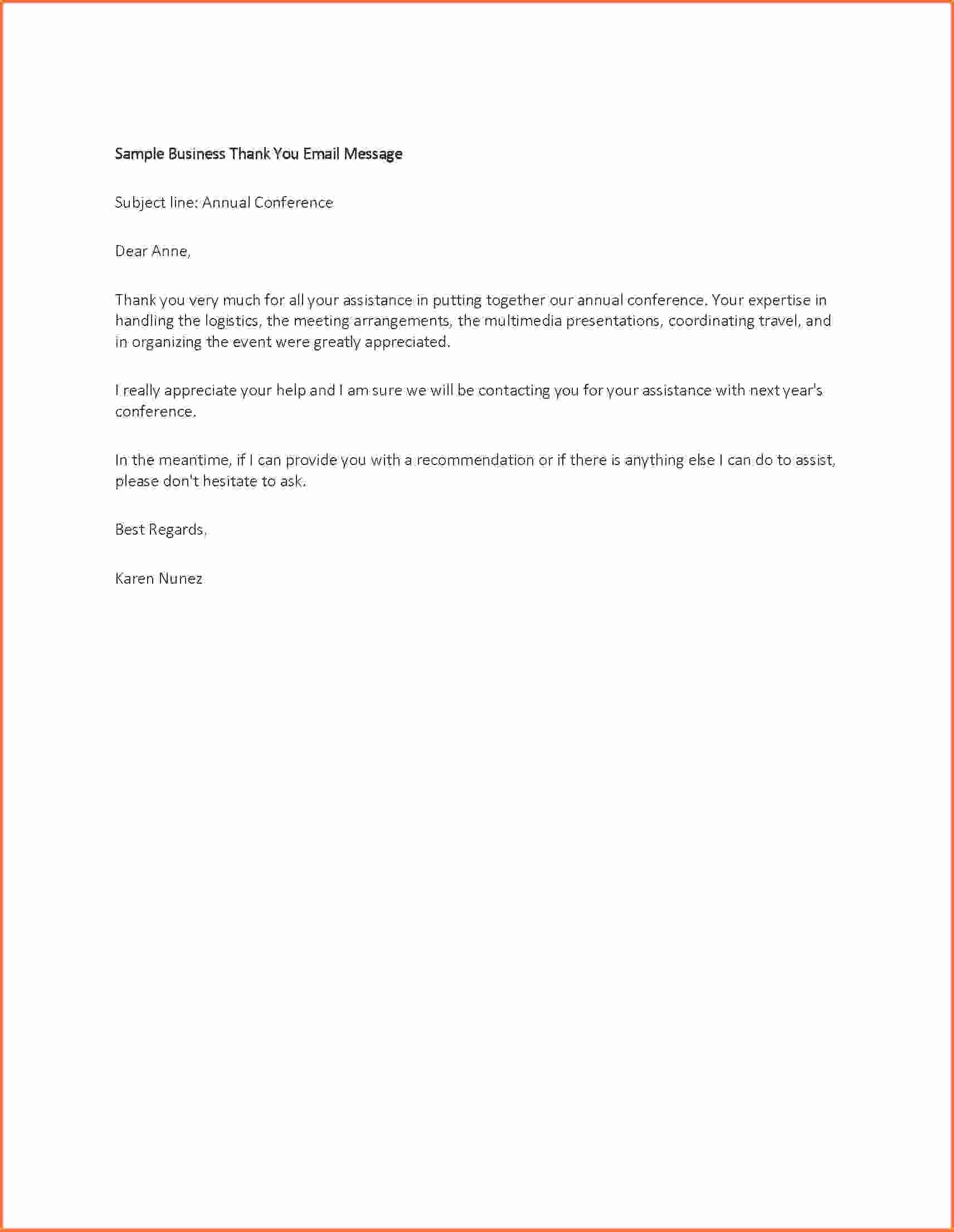
thaymatkinh.co
Details
File Format
PDF
Size: 62 KB
Lovely Interview Thank-You Email Example
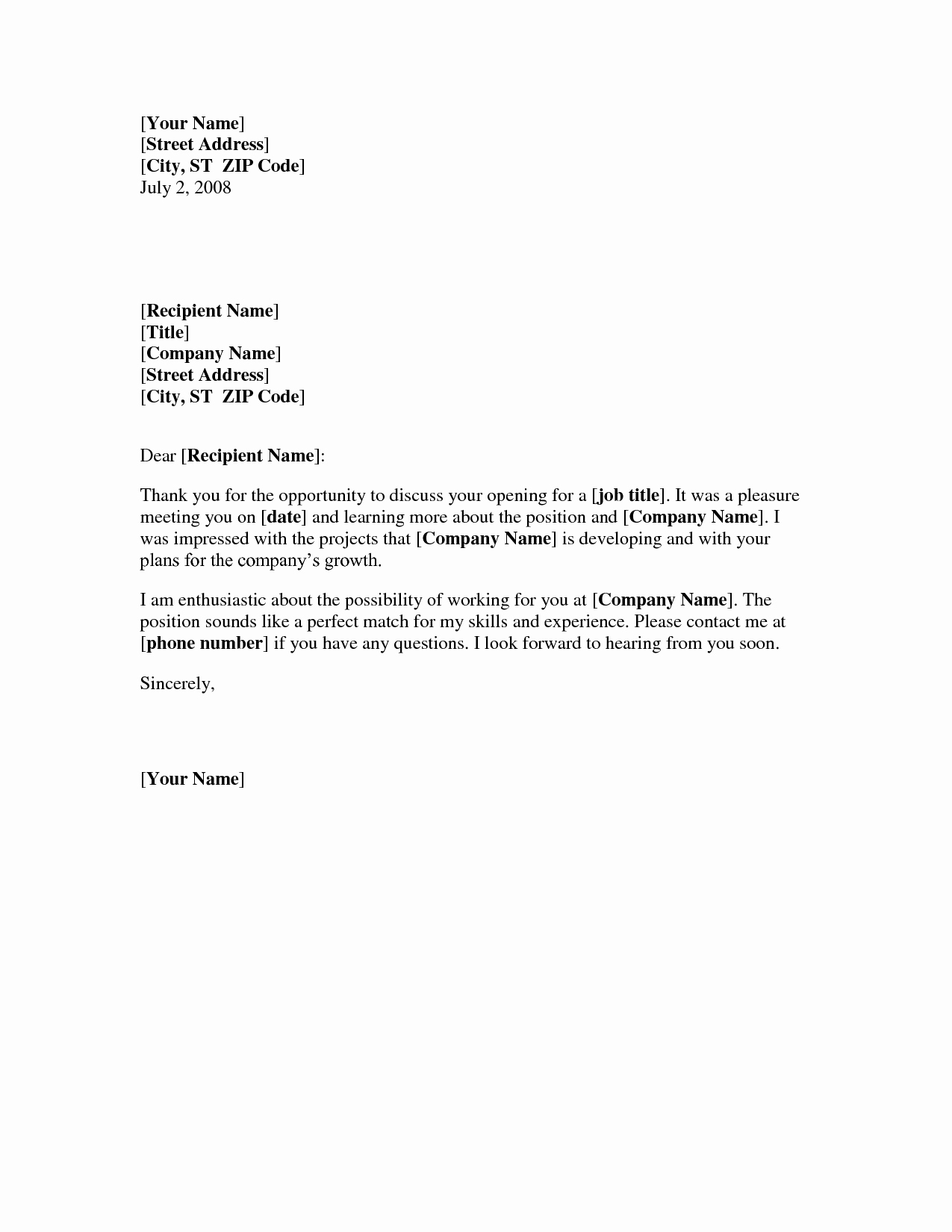
wbxo.us
Details
File Format
PDF
Size: 85 KB
The Anatomy of an Interview Thank-You Email
It’s all too easy to go on the search bar of your computer and download a post-interview thank-you template from an unknown site.
Unfortunately, recruiters are familiar with the tricks of the trade, so you’re bound to get caught one way or another. Though these emails are quite alike in terms of content, only the wisest know the value of writing a message that’s reflective of who you are. Keep in mind that personalization and authenticity are key toward success. It shows that you’re a genuine person, which can increase your chances for the job. You may also see application email examples.
When it comes to composing an interview thank-you email, you must focus on brevity and substance. Every word and sentence in your email must serve a purpose.
So rather than supplying you with a generic template, here’s a simple breakdown of how you can create an impressive interview thank-you email:
1. Subject Line
Like any formal email, the subject line indicates the purpose of the professional letter for recipients to notice. With the number of emails that fill a manager’s inbox on a daily basis, an empty subject line is easy to ignore or miss.
To ensure that an employer gets your message, create a subject line that is specific and attention-grabbing. You need to make it clear and comprehensive, so avoid any creative words that might be interpreted differently. Simply using the words “thank you” is an obvious indicator of what it’s for. You may also like follow-up email examples.
2. Salutation
When addressing your recipient, be sure to keep it formal and accurate with a polite greeting. Writing down “Dear Mr./Ms./Mrs.” is a good choice, as long as you’re addressing the right person, and you know how the interviewer’s last name is spelled. “To Whom It May Concern” might not be a good idea when doing this, or it might seem like you’re addressing multiple people with your format email.
3. Opening Paragraph
Begin your message with a sincere expression of appreciation for the time and effort that was taken to speak with you. Not many applicants get the chance to prove themselves in an interview, so this is a huge deal that you need to be grateful for. A great way to grab their attention is to compliment their recruitment or interview process, and show genuine interest toward the company and its vision for its employees. You may also check out announcement email examples.
4. Body
After which, you can then use the next one or two paragraphs to remind hiring managers of your selling points. You can use this to emphasize anything that you have forgotten to mention during the interview or failed to articulate well enough for the recruiter to remember. You need to be confident with your words to prove that you’re truly interested about working for the company and fitting the job position. You might be interested in email cover letter examples.
Additionally, be sure to make any references in regards to the interview to prove that you were interested and listening to what the recruiter had to say. Be sure to make an invite to contact you at any time if they have further questions they’d want to qualify. The contact information you provide must be updated and active to ensure that you’d pick up if they ever call. You may also see marketing email examples.
5. Closing Line
The end of your email would be just like any other closing remark. You can stick to the old-fashioned “Sincerely, (First Name and Last Name)” for a safe bet. You can also use the closing line written in your cover letter for consistency.
Phone Interview Thank-You Email Example
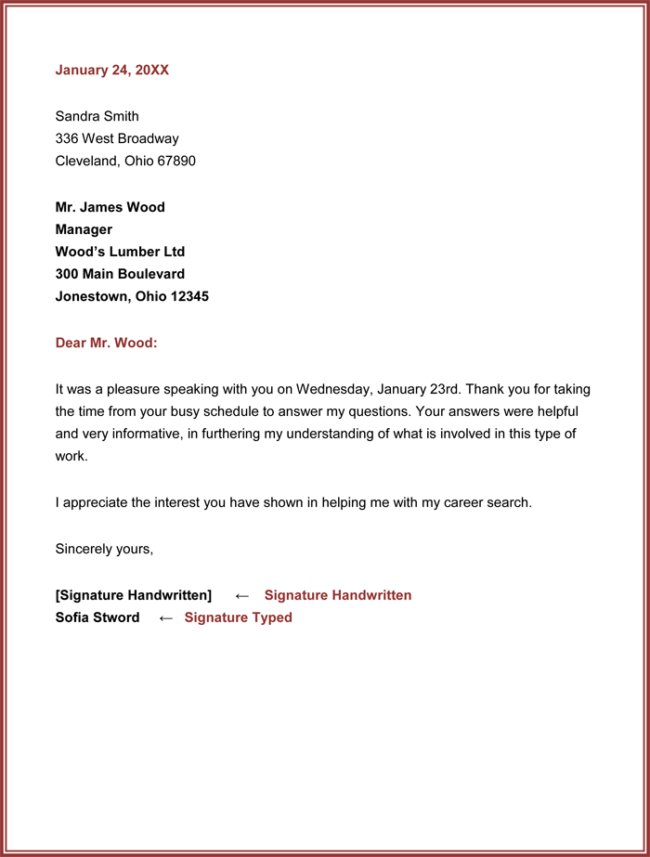
cleverhippo.org
Details
File Format
PDF
Size: 33 KB
Simple Interview Thank-You Email Example
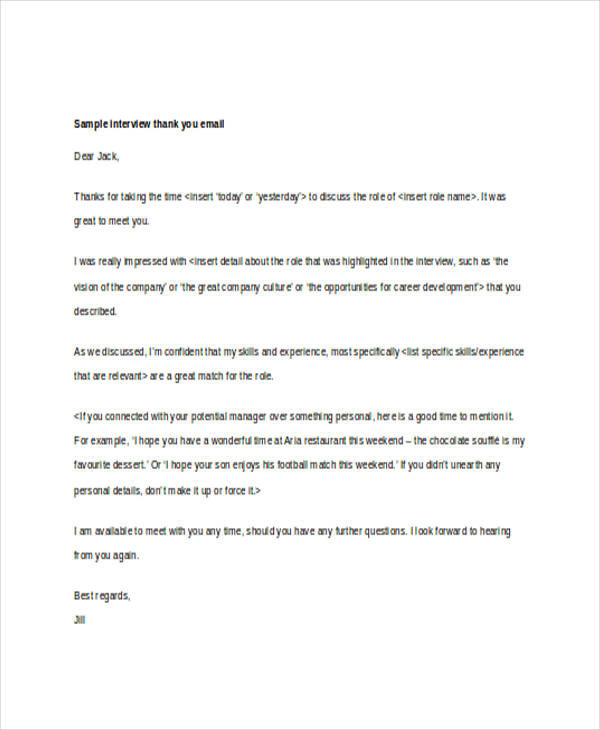
essentialcoding.info
Details
File Format
PDF
Size: 31 KB
Unique Interview Thank-You Email Example
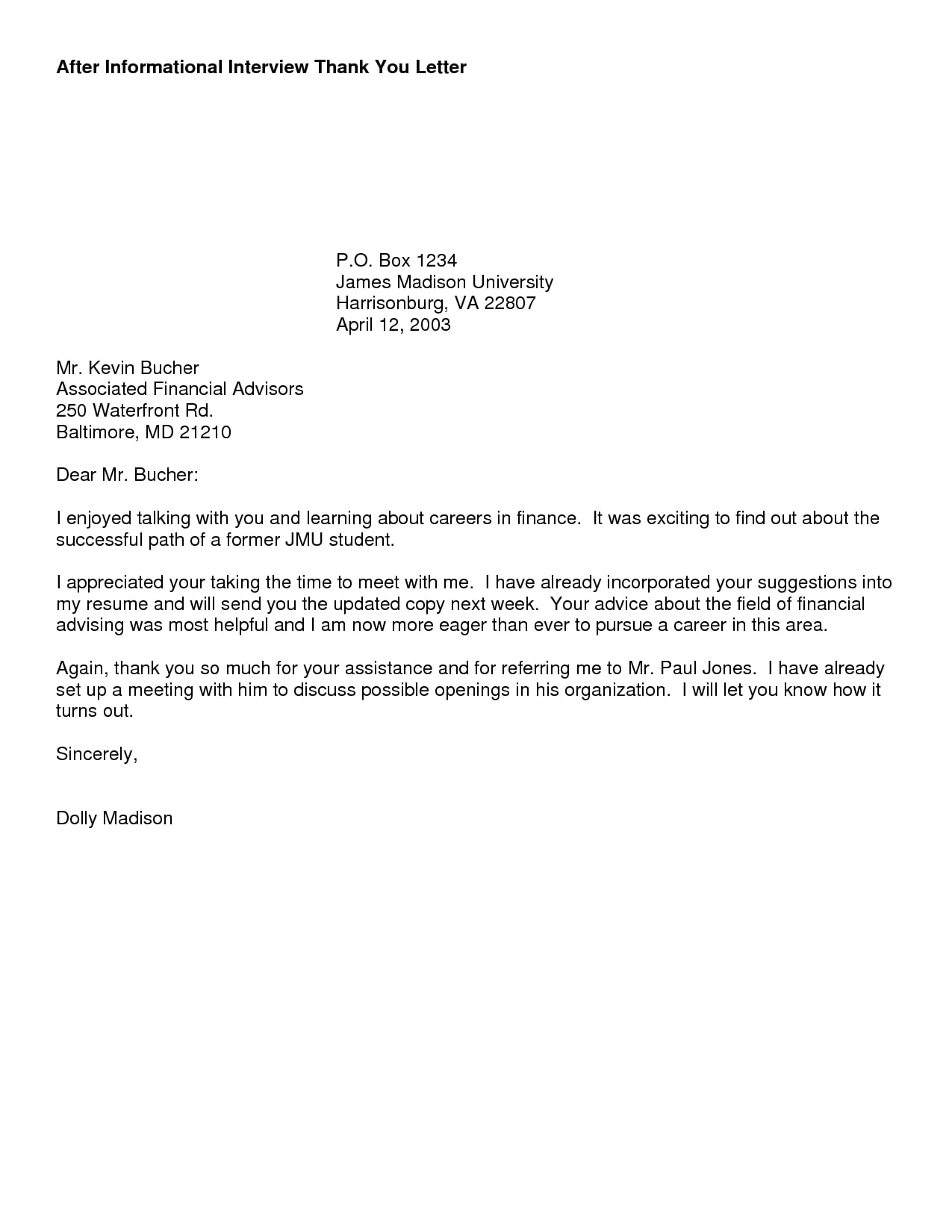
oldstampcollecting.com
Details
File Format
PDF
Size: 103 KB
Things to Remember before Hitting “Send”
Now that you have drafted your letter, there are a few things that you need to review before clicking that “Send” button. With that said, here’s a general checklist to keep you on track:
1. Do it ASAP.
It’s always best to send your email within 24 hours of your interview. This ensures that a recruiter’s memory of you is still fresh, and punctuality certainly says a lot about your character. Keep in mind that timing is everything when it comes to business. You may also see feedback email examples.
2. Match the formality of the employer.
An impressive thank-you note is often something that complements the nature of a business. For instance, there are a lot of companies that strategically enforce a creative and casual environment for its employees. Although you still need to be professional with your letter, this also means that you can use a language that’s not as formal as writing a letter addressed to the President of the United States.
To determine the type of tone to use, take a look at the company’s dress code and workplace. This often says a lot about how the management directs its members. So if everyone’s wearing suits and blazers, your message should be as formal as it can get. You may also like introduction of yourself in an email.
3. Let them know it’s you.
Write a letter that reflects your personality. Letters copied over the Internet can sometimes be bland and generic, which can sound quite robotic to most readers. If you want to make the right impression, make sure you include at least references that will remind the interviewer of your meeting together. This will help the recruiter match your name with a face and an experience.
4. Customize your emails.
If you’re sending multiple emails to different people of the same organization, be sure that your thank-you message varies per email. Using the same template multiple times is a product of laziness. You need to make a connection in order to make an impact with your potential bosses. Otherwise, you may not seem sincere and genuine enough to be a part of the workforce. You may also check out internship email examples.
Tailor the simple letter according to what you know about the recipient. Apart from their standing in the company, since you’ve spoken with them during your interview, then you may have gotten a glimpse of their personality. If your interviewer seemed to focus more on the particular job requirement, then you can make a lead that supports it.
5. Don’t forget to proofread.
Never EVER forget to proofread your standard letter. Double-check, triple-check, or quadruple-check the letter until you’re completely satisfied with the results. Check for spelling or grammar errors in the document. Or better yet, have someone else, such as a friend or family member, take a look at your thank-you email before finalizing it. This allows you to review any mistakes that might have been missed while drafting the letter.
Make sure that names are spelled correctly and that the proper recipients are addressed accordingly. Fatal flaws like these are sure to change one’s perspective toward you.
Sending a post-interview thank-you email to an employer immediately after your meeting can help increase your chances for the job. It shows that you’re good at communicating even in times of uncertainty. With these tips, you can deliver the perfect thank-you message that’s sure to leave a mark on hiring managers.
So whether you feel confident about getting the job or not, it’s important to be polite with your words and courteous with your actions to show that you’re more than just a person with the talent and skills fit for a job role, but a person with excellent character as well.

